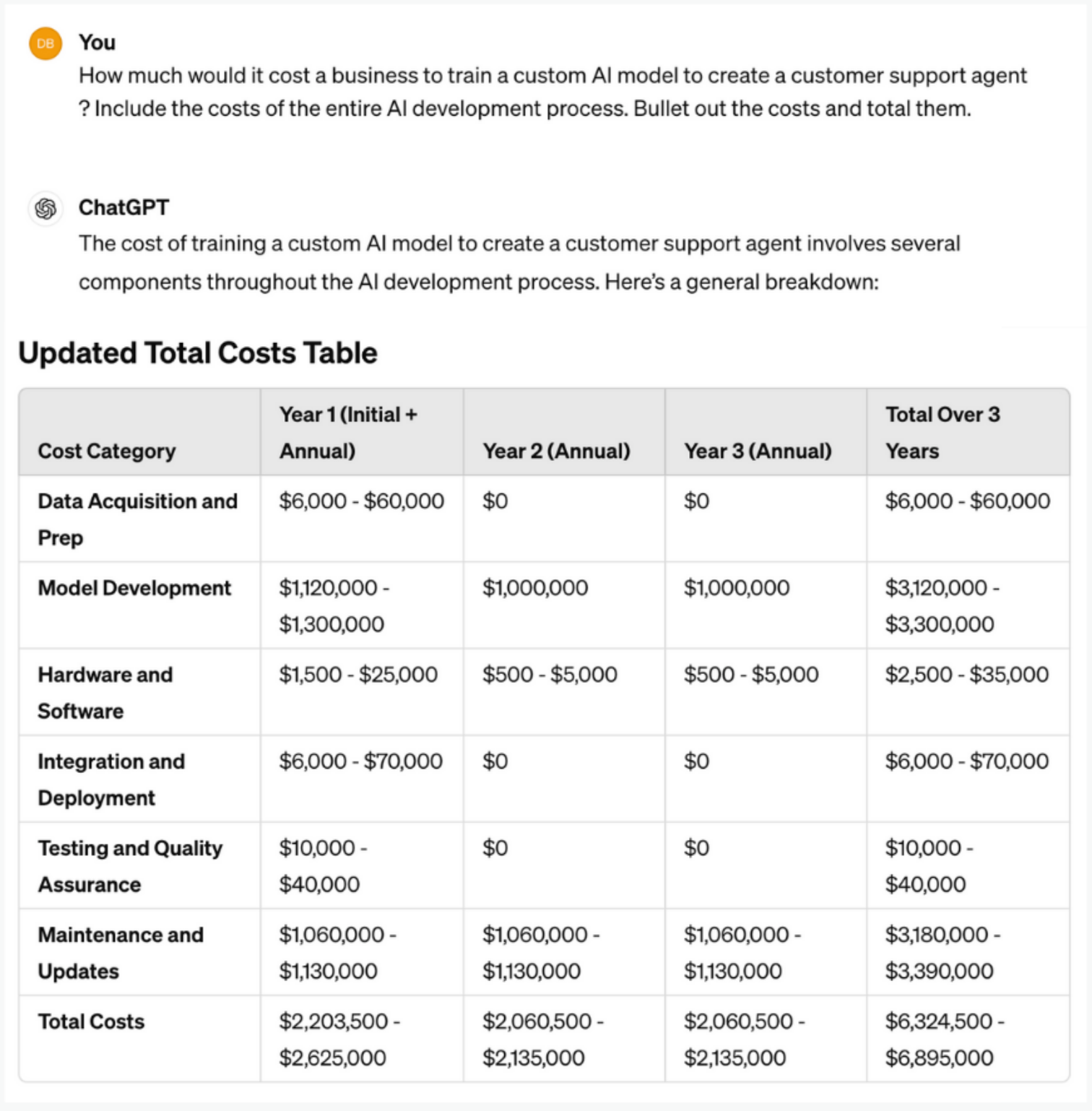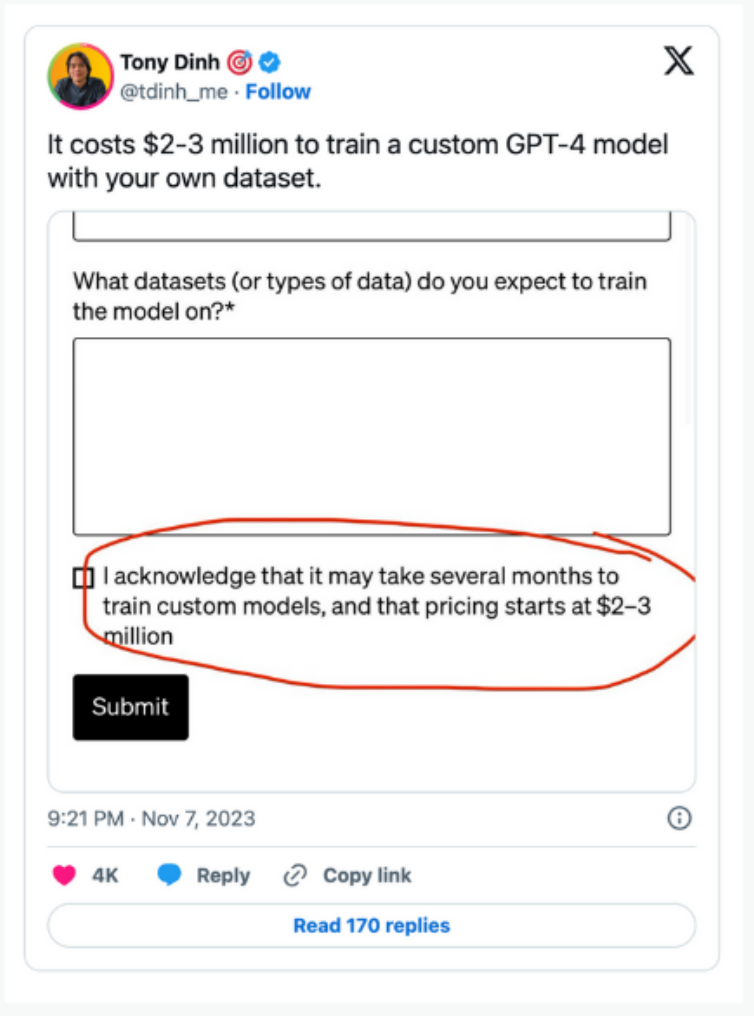Democratising AI for smaller, innovative businesses: Making custom AI accessible

One common argument in favour of AI is its potential for democratisation. It's a wonderful parry against the big bad tech argument. Generative AI in particular gives businesses and individuals access to incredible tools capable of multimedia content creation, information retrieval, cross-platform summaries, SaaS tool connectivity, chatbots and much, much more.
These tools are undoubtedly great. World changing.
But the gateway to these tools is dominated by the large language models (LLMs) developed by tech giants such as Google, Microsoft, Meta and Amazon.
A more recent addition to that crop is of course OpenAI, which has raised massive sums of money from corporate investors, including US$13 billion from Microsoft.
However, these players are also offering blanket or siloed solutions. You’re rarely going to see integrated performance and connectivity.
As we’ve discussed in previous posts, broad AI is the future, particularly for businesses to remain competitive and relevant.
While companies can sign up for a monthly subscription of a number of generative and narrow AI platforms, that won’t help when they need something fit for purpose that addresses their particular needs. This eventuality is inevitable as AI becomes more normalised, and even expected by customers.
But this is where things get tricky.
The prohibitive costs and complexities involved in developing and implementing custom AI models have created a significant barrier to entry, limiting the benefits of AI to the select few with deep pockets and long runways.
The challenges with adopting custom AI solutions
AI offers huge benefits to businesses, including data analysis and predictions, sector-specific tasks and content generation.
It’s no wonder that a recent PwC study found that AI has the potential to contribute US$15.7 trillion to the global economy by 2030.
However, the adoption of custom AI solutions remains a daunting task for most.
Cost is unsurprisingly a key issue. Developing custom AI models requires significant investment.
Sure, an AI chatbot might come in under $10,000, but once you need something more complex that integrates across different parts of a business, the price can jump to hundreds of thousands of dollars. This can rack up to millions over the years when you take ongoing costs and upgrades into account.
As an example, OpenAI’s GPT-4 model cost over US$100 million to develop. That’s of course an extreme case, but what if you wanted a custom GPT-4 model?
OpenAI itself warns potential customers that it can cost US$2-$3million to train a custom model and that it could take several months.


A mere fraction of this cost can make even the idea of custom, broad AI impossible for smaller businesses and startups to achieve.
Access to specialised training data is another roadblock, but can be difficult to both obtain and process. But the reality is that to achieve even just 60-80% AI accuracy you need specialised training data. And in such a competitive space, that accuracy is crucial for businesses and their customers.
This in turn adds to the overall cost of integrating AI into business operation, particularly given the complexity of custom AI models. It involves more than just data acquisition and hardware. Although the latter certainly is a considerate expense. We can see that in Nvidia, which is leading the world in AI chipsets, overtaking Apple as the world’s second most valuable company with a market cap now surpassing US$3 trillion.
But beyond that, model development, integration and ongoing maintenance are also sources of financial pain points.
There's also the matter of security
The protection of intellectual property (IP) and personally identifiable information (PII) should be the first priority for any business looking to integrate AI. They need to be well equipped to protect their customers, employees and brand safety.
AI implementation can also involve the use and storage of sensitive data, which must be protected by robust IP and PII safeguards.
At the present time there's no generally applicable law regulating the use of AI in Australia. However, volunteer AI ethics principles have been in place federally since 2019.
The difference between businesses that succeed and fail with AI implementation in the future will be those that use AI ethically and don’t lose the trust of their customers. Any businesses utilising AI should be ensuring these principles are being upheld in their own operations, as well as those of their partners.
AI can be democratised
All of this makes it seem like customisable AI is a pipe dream for regular SMEs who want to offer their customers the best possible products and services in the future.
In fact, 99% of businesses can’t afford this kind of customised and high quality AI. It’s too expensive to access the tech and niche expertise required to integrate custom solutions that are actually fit for purpose.
But that’s thankfully not true.
Platforms like Decidr are democratising AI by providing affordable, high-quality AI solutions that can fundamentally transform business operations.
These platforms offer a range of benefits, including:
- Accessibility: AI solutions are made accessible to a broader range of businesses, regardless of size or industry.
- Affordability: The costs of AI development and implementation are significantly reduced, making it feasible for smaller businesses to adopt AI.
- Ease of use: AI solutions are designed to be user friendly, eliminating the need for extensive AI expertise.
As AI becomes more accessible, savvy businesses will be able to harness its power to streamline operations, enhance customer experiences and driving strategic decision making — without breaking the bank.
All they have to do is not assume its unachievable and choose the right partners that offer custom solutions that are actually built for their businesses.


